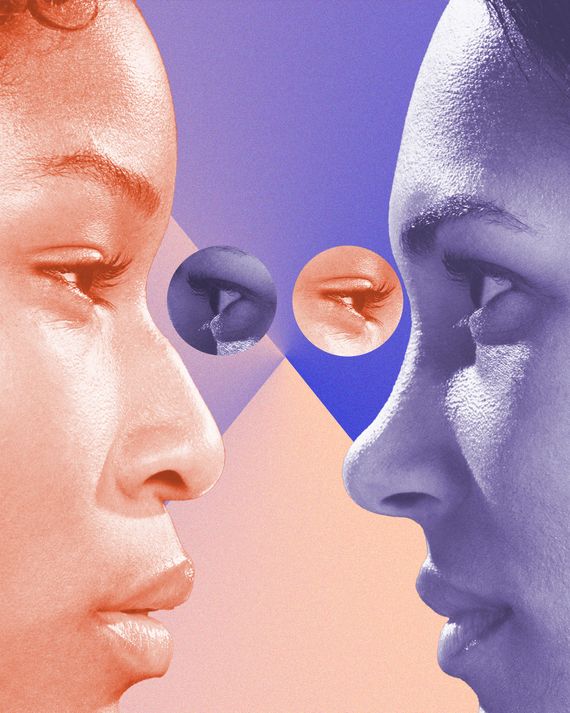
Got Beef? is a series of stories about the grudges we can’t get over (even if we should).
Last year, one of my closest friends committed a violation of biblical proportions: They went after my crush. They did so with all indication that it would hurt me, the crush being a crush — and also a psychologically draining commitment to a convoluted “friendship” that pointed to a fundamental crisis of being. The crush was stupid, I know. But my friend was the person with whom I processed these stupid feelings. I trusted them to look out for me. Three days after I had met them for lunch, during which they agreed that I should let go — the crush seemed negligent, selfish, even “lovebomb-y,” they said — my friend dumped the news that a nascent romance had already been blooming between them. I was startled, mortified. I cried. But also, I thought, This is so fucking annoying.
It was not enough that my friend had lied to me over someone they’d met only recently, through me; they also saddled me with the laborious and inconvenient project of emotional healing. I did not want it. I had better uses for my days, like finding a less weird drug dealer or checking off the last four volumes of Proust’s In Search of Lost Time. (I still have not finished.) Over the next few weeks, my friend would engage in an irritating performance of deference and defensiveness, insisting in passively voiced texts that perhaps more healing was needed, though it was not their place to say, and that discussing in person would be most productive. Productive for whom? This is what bothers me about our supposedly enlightened society: Even when someone has wronged you, it’s you who must shoulder the burden of processing the experience, articulating the damage, and proposing a program for accountability. You must writhe and exorcise until you finally arrive at the magnanimous decision to forgive. And you must forgive.
I did not want to go through the ordeal of agreeing upon a time and reasonably roomy coffee shop just to talk about it. I just wanted my friend to have not done the thing. (Or at the very least to have gone about it more intelligently.) It was then when I started questioning our culture’s exhausting demand for dialogue, which increasingly felt like a diabolical scam invented by cowards to evade accountability. (If there were any words to say between my friend and I, it should have come from them: “Sorry.”) What happened to swift and proportionate consequences, an eye for an eye? Maybe the ancients had it right. Perhaps Hammurabi was onto something.
I thought of his 1750 BCE Babylonian legal text, or at least my AP World History understanding of it, while I was at a tiki bar drinking wine. My companion that evening shared a dilemma with me: He had gotten sloshed at a wedding and punched a guy, who was rightfully and understandably upset about it. But he could not offer much of an apology, because he could not remember what he had done. (Once again, he had been drunk.) He was relying on other wedding attendees’ testimonies. The guy, who allegedly had a reputation for milking injuries, was dissatisfied and wanted to discuss. “Why not give him the opportunity to slap you back?” I blurted, surprising myself.
It was one of those genius ideas that only a Neanderthal, or a man, would think of: simple, intuitive, commensurate with the initial harm. A conventional apology might ameliorate some tension, but an officially sanctioned slap would provide a physical release, a neat outlet for extinguishing anger. It would act as a prophylactic against future carelessness; no more rogue hands at weddings. The Code of Hammurabi codified this form of justice, “lex talionis,” or the law of retribution, but it is a crucial tenet of pop culture. We learn from Carrie Underwood that when a man cheats, his girl will dig her keys into the side of his pretty little souped-up four-wheel drive. From every Italian mob movie that if you fuck with family, your shit gets rocked.
It’s not that I’m advocating for a descent into violence, though I sometimes dreamed of smacking some sense into that friend. I’m just wary of our social impulse to default to language, glib psycho-speak, endlessly complex configurations that obscure the emotional basics. (And I say this as a professional writer.) Some of the worst sentences I’ve ever encountered — syntactically, logically, spiritually — came from career wordsmiths incapable of confronting their own feelings the way they do the page. Grown adults cow behind the immature defense that they “didn’t know” or “didn’t mean to,” leaving the other person to calculate where to fall on the miserable spectrum between “pushover“ and “hardass.” I hate it. More and more, I think that we are living through a crisis of duty. Even mentioning the concept makes me feel like a dinosaur.
As expectations become slippery, relationships tenuous, all I have left to cling to is the railings of legal metaphor. Do I have a right to feel this way? What am I owed? I convene an assembly of friends, my boomer therapist, to screen for gaps in argumentative logic. But no matter how rigorously I present my case, I can’t make the other person hear it. I can’t even guarantee a response. So I fantasize about set material consequences, a community-mandated correction to an imbalance of care. I want responsibility. (And then I feel like a cop.)
What compensation would be equivalent to my loss? Which is the loss of a girlish hope (the crush) and the unshakable belief in a person who, up to that point, I thought understood me better than anyone (the friend). The disturbance of an illusory safety that had already started unraveling as many of my loved ones moved away and coupled up, leaving me the lone occupant of the life we shared, or so it felt. I needed tangible proof of my importance — the guarantee of a month’s worth of dishes done or a paid trip to some ludicrous all-inclusive yogic resort. Something. Anything. I needed relief from my burning disappointment. I thought that my friend, of all people, would already have grasped all this, but I could see that they’d vanished, replaced by some stilted stranger speaking the obstructive language of HR. Maybe I can find my friend again, or maybe they were always there and I’d been mistaken. But the thought of having to explain myself over and over is harder to stomach than the pretense that next time I see them, it’s on sight.


